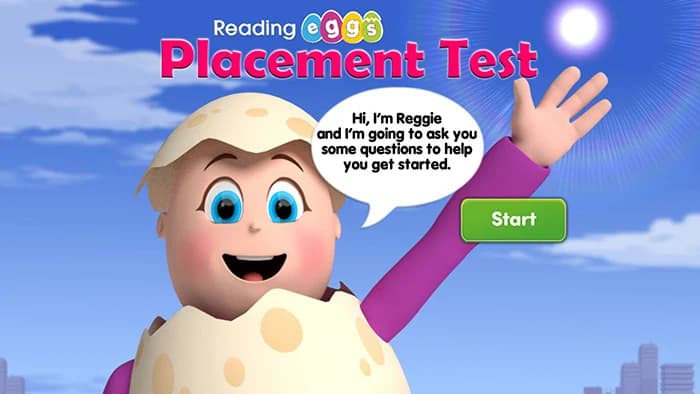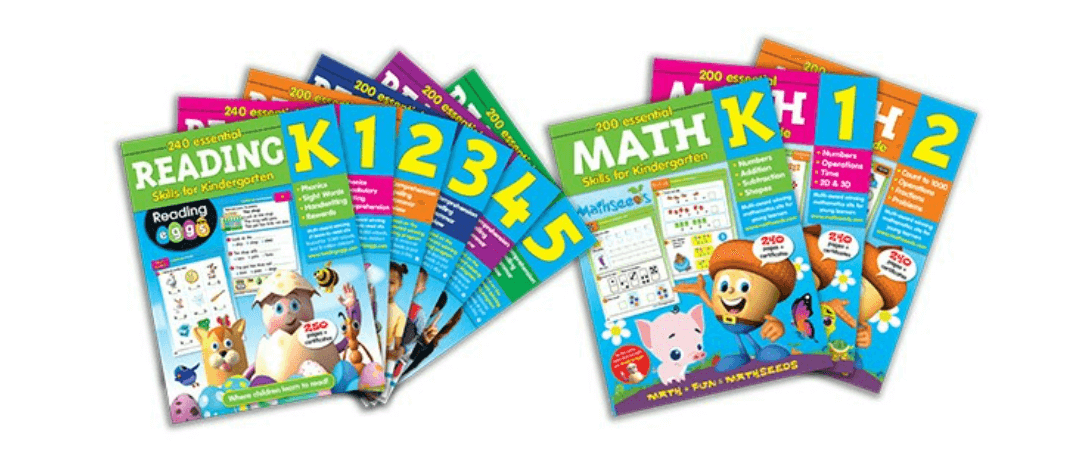


Top Homeschooling Questions Answered

Thinking of homeschooling? Reading Eggs has hundreds of quality resources to make learning from home a cinch. Free trial
Is homeschooling on your mind, but you're not sure where to begin? Discover all the homeschool information, resources and advice you'll need.
There are countless reasons why homeschooling is the best choice for some families. For starters, every child learns differently, and despite schools trying their best, they're not set up to cater to a multitude of unique kids' needs. Then there are families who want their child's schooling to suit their lifestyle or match up with their beliefs.
Homeschooling is also a winner when it comes to convenience – who wouldn't love to skip the often‑stressful morning routine? It isn't fun getting little ones ready for school when they won't wake up on time, their clothes go AWOL at the last minute, and you must navigate through traffic to get to different schools on time.
Have you been considering homeschool as a possibility for your family, but feeling overwhelmed with all the choices? Are you stumped about where to start? Read on for peace of mind. We've done the hard work for you, answering all the big questions, so you can start homeschooling your child with confidence.
The following questions are the most asked when it comes to homeschooling, and will help put you on the right track.
1. What is homeschooling?
Homeschooling is more than just taking part in school-organized Zoom sessions and completing assigned tasks from home. According to the Miriam Webster dictionary definition homeschooling is, "to teach school subjects to one's children at home".
The main difference between attending a brick‑and‑mortar school and homeschool is also one of the biggest pluses; tailoring your child's education to suit their individual needs and strengths, within your family's lifestyle and schedule.
Tempting, right? It's no wonder that across the United States there were about 3.7 million homeschooled students in 2020–2021.
2. Why choose to homeschool?
There are countless reasons why homeschooling is the best option for some families.
These can include:
Being able to focus on a child's specific needs and learning style
Taking medical requirements into consideration
Tailoring a curriculum that fits in with your belief system
Increased schedule flexibility
It doesn't require regular homework or anxiety-inducing tests
Allows for more outdoor or physical activity time
It can even be cost‑effective.
A common motivation to choose to homeschool comes from frustrated parents who have found that the education system is lacking when it comes to what their child needs to thrive.
There's no doubt that schools and teachers try their utmost, but often children with differing needs can fall through the cracks.
Some parents feel that children need individualized lessons and one‑on‑one attention to succeed. They know their child best and can focus on meeting their needs without a classroom of noisy, distracting kids.

Learning at home works best for many kids. Free trial
3. How do I get started with homeschooling?
Knowing where to begin with setting up learning from home can be intimidating, particularly when it comes to creating an engaging, effective homeschool curriculum. It can feel like a mammoth task, but the easiest way to start is by:
Researching what kind of homeschool style suits your family
Reading homeschool reviews or talking to other parents
Exploring and comparing available homeschool programs
Investing in quality resources that can make homeschooling easier.

The Reading Eggs Placement Test is an initial assessment your child is prompted to take when they first use the program. This ensures they'll be working at the correct level for their abilities. Start your free trial today!
Reading Eggs is cleverly designed to look like an online board game, with motivating rewards to be earned as your child progresses through a map. Each stepping stone along the map is filled with engaging lessons, colourful animations and interactive activities that make learning to read fun – your child will want to keep learning.
There are also downloadable Activity Worksheets for each of the 130 lessons that also include details about the Lesson Objectives and Curriculum Alignment. You'll find these in the Bonus Materials section of your Family Dashboard.
Automated progress reports give you an insight into how your child is progressing.
Also included is a huge online library with over 4,000 children's books.
4. What kind of homeschooling is right for our family?
Some homeschoolers love routine while others prefer the philosophy of unschooling, that is, seeing where the day and your child's curiosity takes you.
There are probably hundreds of [personalized] 'in between' versions of homeschooling too, but here are the major styles:
Traditional – If your family isn't quite ready to give up the textbooks, a structured model reminiscent of a school day could be the way to go. This involves following a curriculum closely, keeping school hours and even an instructional approach.
The Classical Method – This very popular approach's goal is to teach kids to think for themselves. It places a large emphasis on reading, classical languages, logic and critical thinking.
Charlotte Mason Method – Follows the teachings of Mason, who believed we must educate the entire person using 'living books' rather than textbooks: Think books written in story or narrative form.
The Montessori Method – Developed by physician and educator Maria Montessori after five decades of research, it involves building on the way children learn naturally.
Unschooling – This is often described as child‑led learning and is diametrically opposed to traditional school methods. This option does away with a curriculum and looks to the child and their passions or life experiences instead.
Eclectic – If you fancy several of these methods this is the way to go as you can incorporate any parts of other methods that work for your family's homeschool operation. This mix and match approach is great for tailoring a personalized approach for your children.
5. What are the benefits of homeschooling over attending school?
Where to begin? There are countless positives and so much flexibility. If something isn't working, there are no rigid school rules or other classmates to take into consideration.
Simply take a deep breath, and choose to focus on a new activity, location or subject.
Learning from home means being able to set up the optimum environment to suit your child's learning style. Kids that are easily distracted, have sensory issues, anxiety, or need regular breaks, thrive when out of a noisy, busy classroom.
Their own comfortable home environment can be less stressful, particularly for those just starting to learn to read or those who may need some extra time to get their heads around math problems.

A homeschool classroom can be anywhere! Teach lessons about the natural world while at the park. The Reading Eggs app is available for both iPad and Android devices. Free trial
You can alternate learning methods and environments. Choose from an array of apps for learning on the go, or head outside with a fun printout.
To homeschool means you have an insider's head start and can craft a nurturing home learning environment that is your family's optimum learning space.
Public school may seem free, but it isn't once you factor in the financial and time costs involved. Paying for field trips, transportation and school supplies, among other things, comes at a price. Not to mention ferrying multiple children to different schools!
6. Do parents need special qualifications to homeschool?
This can be a real concern for parents starting out on their homeschooling journey, especially if they compare themselves to schoolteachers.
The latter require a teaching degree to educate children in a school, so it's understandable that many people believe homeschoolers might require training too.
Feel confident in the knowledge that you don't need formal qualifications. There are many aspects that are key to being a schoolteacher that don't apply when it comes to teaching kids at home. Many factors tie into the benefits raised earlier in this article.
As homeschoolers are not bound by traditional school conventions and styles, you can adapt learning plans that work best for your child's abilities and interests, rather than adhering to a strict methodology.
You can help your child learn phonics and do math!
Stressful tests and evaluations aren't necessary as you can see how your child is responding to learning day‑by‑day, rather than needing a report.
Classroom management techniques might be worth researching if you're homeschooling many children.

Flexibility is one of homeschooling's biggest pluses and if you're juggling multiple kids' learning, a Reading Eggs subscription allows access for up to four children at no extra cost. Free trial
7. How much does homeschooling cost?
A common mistake many first‑time homeschoolers make is to jump right in and sign up to a very expensive plan. This is a case where more money might not always translate as the most suitable choice.
Homeschooling can get very expensive if you don't know how to find or navigate the best resources and opportunities. However, one of the many advantages homeschool offers is being able to build a program to suit your purpose. Why not try before you buy?
Start with programs that offer free trials, such as Reading Eggs. Your free trial will give you 30 days to explore the program and all the features with your children at no cost.
Homeschool apps are another great way of keeping costs down, while keeping lessons interesting and parents organised.
The freedom of homeschooling also means you can mix up learning locations and experiences with resources such as libraries, heading out on day trips, or learning within your community.

A Reading Eggs subscription gives you access to multiple online programs, as well a library of 4,000+ e-books covering a wide range of genres and subjects. Each online lesson has accompanying downloadable worksheets for offline learning. In addition, optional comprehensive homeschooling workbooks that match the programs can be purchased separately.
Try the award‑winning homeschool reading program FREE for 30 days
Join 20 million users and see how Reading Eggs can improve your child's reading skills in just 15 minutes a day. It only takes a few minutes to set up, and you'll get instant access to hundreds of online lessons, activities, 4,000+ kids' e-books and printable worksheets – perfect for your family's homeschooling needs.
8. Will homeschooling affect my child's social skills?
Despite the sometimes‑negative perception heaped on homeschooled kids, there are so many ways to keep your child socially engaged with their peers or their local community.
Take advantage of opportunities to play fun, competitive online literacy games with other homeschooled children, or meet up in person for group field trips.
Joining a sports team or an afternoon creative pursuit is also a great way to help homeschooled kids enlarge their social circle and have fun.
Don't forget about yourself either as the homeschool facilitator! The homeschool community is tight-knit and well‑organized so it's a great way for kids, and parents, to make new friends and share ideas.
Stay connected in Facebook groups where you can ask questions and even organize meet ups.

Join up with other homeschooling families for fun field trips.
9. How many hours a day should we spend homeschooling?
There are as many answers to this question as there are learning methods and styles. Figuring out which schedule your family should follow can be a pleasant experience because of the flexibility homeschooling affords.
It will also depend on your preferred approach, your children's interests, and any group after-school activities they may take part in. Not to mention every other family member's schedule!
A popular choice amongst homeschoolers is to learn in the mornings and use the afternoons for outings or free time for kids to follow their passions.
Some opt to homeschool less than five days a week, unlike standard school schedules.
Find what works for your family and you can always alter any routine that becomes unsuitable.

Enjoy the freedom homeschool offers to learn with apps. Free trial
10. Where do I access quality homeschool resources?
The good news is it's easier than ever to get your hands on quality learning assets that will tie in with your preferred homeschool method.
Online resources make accessing a plethora of materials and teaching ideas a cinch, to help your child learn and keep them motivated.
The Reading Eggs multi‑award winning homeschool reading program offers 1000s of ideas and books to keep building on your kids' knowledge and skills in an entertaining way.

Homeschooling might seem like a huge undertaking, but we hope we've shown you homeschooling isn't so hard with great resources.
The benefits are endless and, with the right resources, you'll be homeschooling with confidence.
Try the award‑winning homeschool reading program FREE for 30 days
Join 20 million users and see how Reading Eggs can improve your child's reading skills in just 15 minutes a day. It only takes a few minutes to set up, and you'll get instant access to hundreds of online lessons, activities, 4,000+ kids' e-books and printable worksheets – perfect for your family's homeschooling needs.
Homeschool Reviews and Testimonials
“This program is fun and educational. My 6‑year‑old daughter loves it. It has helped her learn to read and with her numbers. She asks to use it all the time. I love that this program helped give her a love of learning. Thank you, Reading Eggs and Mathseeds!”
– Nay, verified reviewer
“I absolutely love it. It has greatly helped my daughter with her math as well as recognizing letters. She has gotten so much better. The fun repetitive games are amazing. We utilise it with our homeschooling and it's a fun, interactive way to learn.”
– Asia, verified reviewer
“I got Reading Eggs for my granddaughters to both practise and learn reading and math. They were 7 and 4 at the time. They have progressed so much that the 4‑year‑old is already doing first grade math and she just started kindergarten. She is reading early and loves to earn her eggs and acorns.”
– Robin, verified reviewer
“I love Reading Eggs for several reasons. The most important reason is because my struggling readers love Reading Eggs and are making so much progress! I use it to guide my homeschool instruction for both of them. They do not resist, and they love when my direct instruction aligns with the skills they have practised on Reading Eggs. Sometimes I use Reading Eggs as a preview of material and sometimes as a review. It is very effective either way. I wouldn't want to homeschool without it! The data is great and so are the supplementary resources."
– Amy, verified reviewer






